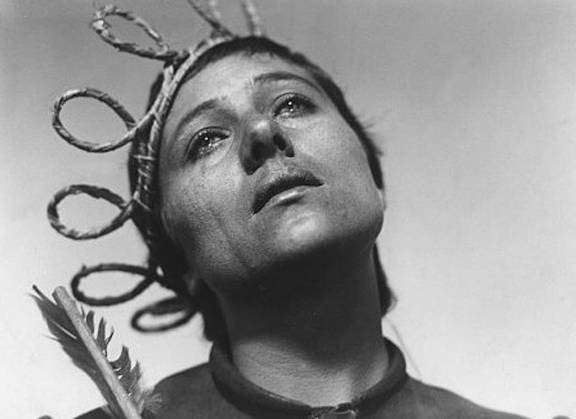SEPTEMBER 29, 2021 – STARTING AT 6:15pm (Pacific)
With special dates set aside for National Bubble Wrap Appreciation Day and National Name Your Car Day, why shouldn’t there be a day dedicated to celebrating, preserving and creating access to silent films? TCM’s line-up for this daylong fest touches on a small portion of the cinematic riches that were produced before the advent of sound, but it includes some of the very best.
First up – chronologically but not in order of airing – is the legendary short A Trip to the Moon (1902) by the innovative director Georges Méliès, who was given a worthy tribute by Martin Scorsese in Hugo (2011). Bringing a sense of magic and fun to early cinema through the use of ground-breaking special effects, Méliès borrows from Jules Verne and H.G. Wells to tell the tale of a fantastic lunar expedition in 30 incredible tableaux.
Méliès’ life story, from illusionist to cinema artist to forgotten proprietor of a toy store in a Paris train station (the setting for Scorsese’s movie), is detailed in the documentary Le mystère Méliès/The Méliès Mystery (2021). Archivist-scholar and host of TCM’s Silent Sunday Nights, Jacqueline Stewart, joins the schedule at 8pm to introduce the film. She’ll also be on-air to host the screening of Be Natural: The Untold Story of Alice Guy Blaché (2018), an acclaimed documentary about the early success of the landmark filmmaker, her fade into obscurity and the efforts to reclaim her and her works from neglect. Jodie Foster narrates this look at an extraordinary woman whose prolific output numbers more than 450 films between 1896 and 1920.
Another pioneer, African American film director Oscar Micheaux, is represented by his early work. Within Our Gates (1920) is the second of 42 films, most of them self-written, by Micheaux who made his debut with the first feature-length motion picture produced by a Black filmmaker, The Homesteader (1919). Within Our Gates tells the story of an educated woman who dedicates herself to saving a near bankrupt school for impoverished African American youths.
A number of international directors made silent films that are some of the most important and influential not only of their era but of all time. Danish director Carl Theodor Dreyer’s The Passion of Joan of Arc (1928), depicting the trial and execution of the 15th century saint, is still considered a landmark of cinema, and Maria Falconetti’s performance as Joan is often listed as one of the greatest in film history. Battleship Potemkin (1925), directed by Russian film artist and theorist Sergei Eisenstein, contains one of the most celebrated and imitated scenes ever – the massacre of civilians on the Odessa steps. Shot mostly in the Mojave Desert, The Wind (1928) by Swedish director Victor Sjöström gave Lillian Gish one of her greatest roles and audiences a harrowing classic scene (the wind uncovering a buried corpse). Sjöström started his career in his native country and came to Hollywood in the 1920s, directing such screen legends as John Gilbert, Lon Chaney and Greta Garbo.
One of the greatest stars of the era with a truly global following, Garbo is represented here by one of her most iconic roles as the woman who comes between two friends in Clarence Brown’s romantic drama Flesh and the Devil (1926). Other great stars of the era also get their due in the day’s schedule, including Mary Pickford in Sparrows (1926) and Rudolph Valentino in The Four Horsemen of the Apocalypse (1921). This day is also a rare chance to see the first Asian star of American film, Anna May Wong. Frustrated by the stereotypical roles she was being given in Hollywood, Wong went to the U.K. for the drama Piccadilly (1929), co-starring Charles Laughton. The film was originally released as a silent early in the year, then re-released several months later with a music score, sound effects and prologue for theaters equipped for sound.
Finally, no day commemorating silent movies would be complete without the great comic talents of the era. Three of the most popular are included here: Harold Lloyd’s The Freshman (1925); Charlie Chaplin’s touching City Lights (1931), produced as a silent even after the beginning of the sound era; and Buster Keaton’s wildly inventive Sherlock, Jr. (1924). Keaton also gets the biographical treatment in Peter Bogdanovich’s documentary The Great Buster (2018), which gives him his due as a timeless film visionary.
6:15 AM — Flesh and the Devil (1926)
8:15 AM — The Wind (1928)
9:45 AM — The Battleship Potemkin (1925)
11:00 AM — City Lights (1931)
12:30 PM — Within Our Gates (1920)
2:00 PM — The Passion of Joan of Arc (1927)
4:00 PM — The Four Horsemen of the Apocalypse (1921)
6:30 PM — The Freshman (1925)
8:00 PM — The Melies Mystery (2021)
9:15 PM — A Trip to the Moon (1902)
9:30 PM — Be Natural: The Untold Story of Alice Guy-Blache (2018)
11:15 PM — The Great Buster: A Celebration (2008)
